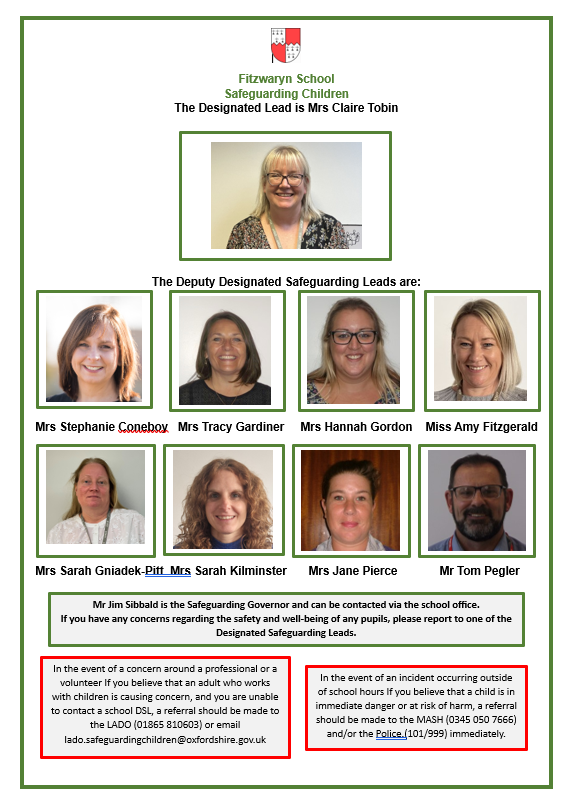Safeguarding
At Fitzwaryn School the safeguarding of our pupils is our highest priority.
Fitzwaryn School's Child Protection and Safeguarding Policy (attached below) provides clear direction to all school stakeholders about expected practice in dealing with safeguarding issues. It makes explicit the school’s commitment to the development of good practice and effective procedures, ensuring that safeguarding concerns and referrals are handled sensitively, professionally and in a way that supports and protects the needs of the child.
The Fitzwaryn safeguarding team:

Mrs Claire Tobin is the Designated Safeguarding Lead at Fitzwaryn.
The full list of Deputy Designated Safeguarding Leads are: Mrs Stephanie Coneboy, Mrs Tracy Gardiner, Mrs Hannah Gordon, Mrs Jane Pierce, Miss Amy Fitzgerald, Mrs Sarah Gniadek-Pitt, Mrs Sarah Kilminster and Mr Tom Pegler.
If you have any concerns regarding the safety and well-being of any pupils, please report to one of the Designated Teachers for Safeguarding.
If none are available, please report your concerns to Mr Jim Sibbald (Safeguarding Governor) via the School Office 01235 764504.
If none of the above are available, then please report to Jo Lloyd (Local Authority Designated Officer) (01865 810603 or lado.safeguardingchildren@oxfordshire.gov.uk).
In the event of an incident occurring outside of school hours
If you believe that a child is in immediate danger or at risk of harm, a referral should be made to the
MASH (0345 050 7666) and/or the Police (101/999) immediately
Staying Safe Online
At Fitzwaryn we are committed to ensuring our pupils are safe in school and online.
Whilst many Internet Service Providers offer filtering systems to help you safeguard your child at home, it remains surprisingly easy for children to access inappropriate material including unsuitable texts, images and films. Parents/guardians are advised to set the security levels within Internet Browsers with this in mind.
Locating the device to access the Internet in a family area will enable you to supervise children as they use the Internet. However, don’t deny your child the opportunity to learn from the wide variety of material and games available on the Internet. Instead, set some simple rules for keeping them safe and make sure they understand the importance of these rules.
Cyberbullying is any form of bullying which takes place online or through smartphones and tablets. Social networking sites, messaging apps, gaming sites and chat rooms such as Facebook, Xbox Live, Instagram, YouTube, Snapchat and other chat rooms can be great fun and a positive experience, but they can be used as platforms to upset and bully individuals. (Please see the Cyberbullying guidance at the bottom of the page.)
Pupils are regularly accessing multiple platforms - click on the links to find information about privacy settings, blocking users and reporting procedures on these different platforms.
- Support for children:
- Childline for free and confidential advice
- UK Safer Internet Centre to report and remove harmful online content
- CEOP for advice on making a report about online abuse
Click on the link for the latest advice to parents and carers on keeping children safe from harm.
EAL (English as an additional language)
Please click in the link below to find resources aimed at supporting pupils online in a wide range of languages.
Early Help
All agencies that work with children, young people and families are responsible for listening to your concerns and worries and working closely with you to make sure you and your family get the right support at the right time.
At times children and families need a bit of extra support – and when that happens, it’s ok to ask for help. Early help is there to make sure worries don’t become bigger and you get the support you need at the right time. You may have found out about how early help can make a difference from a teacher, health visitor, midwife, school health nurse, early years practitioner, doctor, voluntary worker or another trusted professional already working with you.
Early help brings together all the relevant services in Oxfordshire so they are working in a co-ordinated way to support families.
There are lots of different reasons you might need early help:
- You could be worried about your own or your child’s health, development or behaviour, or how things are going at school or nursery.
- You could be caring for others, or maybe you’ve had a bereavement in the family, and it’s made life a real challenge.
- It may be that you’re worried about money or housing and how it’s affecting your family.
- Maybe you or your family are affected by domestic abuse, mental health, drugs, alcohol or crime.
Please click on the link for more information on how the Early Help process could help you:

 Academy Trust
Academy Trust